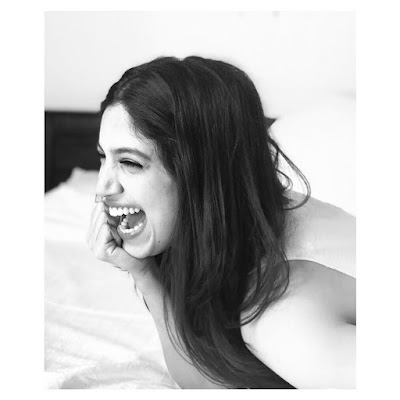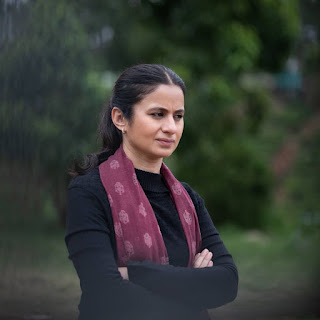Bhumi Pednekar: Of backing cinema that celebrates women
Radhika Bhirani
Cinema, in its role as a reflection of society, Bhumi feels, must show strong women who represent how the gender doesn't have to be submissive.
"I can't wait for the world to watch it. It truly celebrates womanhood."
In our chat ahead of the International Women's Day in March, before the lockdown changed life as we knew it altogether, Bhumi Pednekar gushed about Alankrita Shrivastava's Dolly Kitty Aur Woh Chamakte Sitare, a story about women finding freedom, as you'd expect an actor of her footing to do.
I say footing, because the foundation of her five-year-old career is rooted in a film with a hefty message at heart. Her maiden film Dum Laga Ke Haisha picked on how the society at large weighs an overweight woman on a scale of inadequacy.
As part of essaying Sandhya Verma, an educated and progressive woman in a small town milieu, Bhumi was able to offset several perceptions, not just about being a 'Bollywood heroine', but about women.
It's a path she has continued to be on with subsequent films.
"Right after Dum Laga Ke Haisha, I was very fortunate to have an opportunity to get a mixed bag of scripts. That's why I could make the kind of choices I made. I know this is something that doesn't usually happen at the start of your career, considering the kind of journey I have had," said the actor, pausing to remind, "I am not from a film family. I am a regular Mumbai girl who had dreams of becoming an actor, and I have worked my ass off to be one."
Earning the 'queen of heartland cinema' epithet in present-day Hindi cinema came to Bhumi as a result of following her heart into taking on such roles as; a rural woman who raises her voice against the concept of open defecation in Toilet: Ek Prem Katha, as a girl who stands up for love with a man facing erectile dysfunction in Shubh Mangal Saavdhan, as a gritty woman navigating the world of dacoits of the Chambal ravines in Sonchiriya, as a septuagenarian sharp-shooter in Saandh Ki Aankh and as a spirited girl who combats colour prejudices with her sharp intellect and tongue in Bala.
Up next is Dolly, Kitty Aur Woh Chamakte Sitare (to be out on Netflix), which features her as a 21-year-old girl who is full of dreams and ambitions for a beautiful life.
In a complete contrast, there is also Durgavati, a horror thriller where she plays an IAS officer.
"The kind of films that I do are quite diverse. I try and up the game with every performance. At least that is what I aim for, and I think Durgavati has given me a big canvas to do the same," she said, excited as she was about "kind of helming the movie on my shoulders".
But looking at her oeuvre with a wider lens, Bhumi, who turned 31 on July 18, shared candidly, "The person that I am today is a sum total of all the characters I have played."
"When you meet a Chandro Tomar and a Prakashi Tomar (whose real life story inspired Saand Ki Aankh), and you hear their stories, or when you do a film like Sonchiriya, Dum Laga Ke Haisha or Durgavati, you realise these women are really strong. It has made me more humble and given me a bigger drive to do as much as I can for my gender, and for people in general," said the actor.
While she finds it "liberating" to essay such characters, they also make her realise the need to be grateful for the place she was born in.
"I truly feel I am privileged. And that doesn't only mean having money. It means the fact that I was given education, protection and basic rights which a lot of women in India don't get. It's an understanding I had because of the cinema that I do."
That may also be a reason why Bhumi speaks so passionately when she does about the "warped" representation of women that the big screen has mollycoddled, often casually, over the years.
In that sense, Bhumi felt that Thappad, starring Taapsee Pannu -- another strong female voice in today's Bollywood -- was a "welcome breather".
"There was no space for a Thappad a few years ago. We have always had submissive characters in cinema. That's how we have always shown our women -- very whitewashed, very dependent on the other gender, with no desires, no ambitions, and we have always celebrated a woman who gives everything up for her family. I find that concept a little warped," said the actor.
Here, she stopped to clarify.
"This is not a direct comment on women who actually give up a lot of their lives. But I don't like the fact that we think that they 'give up' their life. I think it's a choice they make. So, let's not glorify their sacrifice. I find that weird. Instead of glorifying it, let's just understand the fact that running an ecosystem isn't easy," Bhumi explained.
To her, Thappad represented how people don't even realise how deep-rooted misogny is in our society.
Bhumi went on: "The social conditioning is so deep... Even if it is something as simple as telling the woman in the family that 'Oh, don't travel late at night'. I understand it comes from a place of a safety concern, but the question to ask is, 'Why aren't we successful in making the environment safe enough for women yet?'"
It's a question we definitely need to ask, when on one hand the country is progressing, making technological breakthroughs, and on another, dealing with age-old problems like sexism.
Sexism, as it happened, became a bone of contention as far as Bhumi's 2019 film Pati Patni Aur Woh was concerned. The film had got embroiled in a row over a misogynistic and sexist dialogue, which courted criticism for normalising and trivialising marital rape.
It turned out to be a case of once bitten, twice shy for Bhumi, who said she is now more prudent about the scripts she takes on. Nevertheless, she was proud that the film's team had accepted the mistake and rectified it.
"I've been extremely cautious," Pednekar said when asked if she was being more careful since the Pati Patni Aur Woh episode.
"Nobody from the team shied away from talking about it. It was truly a lack of diligence on our part, and that's why it was rectified. I remember while promoting the film, I kept telling people that it was not a sexist film, and that otherwise I wouldn't have done it. But unfortunately, that whole debacle happened, and even the makers felt that 'Oh my God, we've really gone away from the messaging of the film'," she added.
Her learning? Even one erroneous dialogue "can really take away from what a film stands for".
"Women are made in a way where they are maternal, more sensitive and more emotional. But that should not be taken as a weakness. That's our strength. So, I really hope that our audiences get a lot more inspired with films where there aren't submissive women," she said.
In her own journey as an actor, Bhumi hopes to continue working towards creating a niche for herself.
"I was always clear about it... I did not want to go the regular route because I wouldn't have any fun doing that. I've always wanted to leave behind a legacy, not prove a point, but just be a part of films that can be remembered, characters that I can leave behind because that's the idea of cinema -- it lives on forever," she asserted.
It's a reality she has always been conscious about, and there's only a sense of pride in her voice when she says that, "Such scripts come my way because I have always played a woman who will eventually be celebrated."
Cheers to that!








Comments
Post a Comment